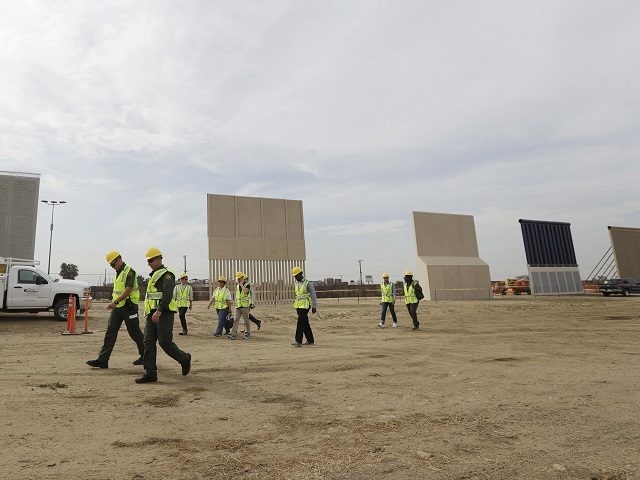The Senate’s homeland defense budget committee voted to fund President Donald Trump’s $1.6 billion request to build or upgrade 74 miles of border wall but rejected his request for extra funding to repatriate or block more illegal migrants.
The House has already approved the $1.6 billion in border-wall funding, so the Democrats’ next best chance to stop the funding is a vote on the Senate floor.
The wall funding is just 3 percent of the over $51.6 billion bill, which funds all aspects of homeland spending in 2018.
The committee refused to add funding for 850 extra repatriation officers or funding to increase detention space for the rising wave of migrants who claim asylum at the border. Trump had asked for funding to detain 51,379 migrants pending their court hearings, but the GOP and the Democratic Senators kept the funding at the 2017 level of 31,000 spaces. The reduced funding will require officials to release migrants whenever all of the 31,000 detention spaces are occupied.
Trump had asked for $3.6 billion for a larger detention program, but the committee only approved $2.9 billion, up slightly from the 2017 spending of 2.7 billion, said a committee explanation of the spending. Committee members just urged DHS to be more efficient, saying:
The Committee understands that significant detention bed space is required for the removal of aliens but notes that improvements to throughput in the immigration enforcement continuum could reduce the average length of stay for detainees, ultimately requiring fewer detention beds. The Committee directs ICE to continue working with Federal partners, including the Executive Office for Immigration Review, to ensure that aliens are treated fairly while expeditiously moving through the immigration enforcement process.
The GOP-majority panel funded the wall grudgingly and did not seek to accelerate implementation of Trump’s election-winning border-wall promise. In fact, it urged Trump to divert some of the border-wall funds to buy “virtual wall” technology — such as cameras — which can be quickly deactivated by a future pro-cheap-labor administration. The panel said:
Physical Barriers and Tactical Infrastructure.—Border security is critically important to the national security of the United States, and the Committee is committed to providing appropriations to secure U.S. borders … The Committee recommends $1,630,232,000, including $1,571,239,000 for physical barriers and $20,000,000 for border roads. As a physical barrier is but one component of a border security system, the Committee believes it is imperative to include appropriate sensor technology, including fiber optics and camera systems, with the barrier system.
The GOP members of the full homeland defense subcommittee are Sen. John Boozman, Sen. Richard Shelby, Sen. Lisa Murkowski, Sen. John Hoeven, Sen. James Lankford, and Sen. John Kennedy, and the ailing Sen. Thad Cochran.
The full committee also includes Sen. Mitch McConnell, Sen. Lamar Alexander, Sen. Susan Collins, Sen. Lindsey Graham, Sen. Roy Blunt, Sen. Jerry Moran, Sen. Shelly Moore and Sen. Marco Rubio.
Despite the small amount of funding for the border wall, Democrats continued to complain about the wall, which will symbolically and practically hinder the northward flow of cheap foreign labor into Democratic-dominated cities through the nation. Sen. Patrick Leahy, the top Democrat on the appropriations committee, declared the border-wall funding should be spent on the Democratic party’s priorities:
This is bumper sticker budgeting to save face for one of President Trump’s failed campaign promises. Instead of wasting billions of taxpayer dollars to fund this costly and ineffective proxy for real action on immigration reform, we should be directing our resources toward finding cures for cancer, building schools for our children, feeding the hungry, rebuilding our infrastructure and real security. We should be investing in what brings us together, not building walls that drive us apart … Building a wall along our southern border is a waste of taxpayer dollars and an insult to our neighbor to the South. From every perspective, this costly wall is an unwelcome turkey.”
Montana Democratic Sen. Jon Tester also opposed even the small amount of funding for the border wall, despite his pending 2018 reelection campaign. He said:
this bill funds a costly and ineffective border wall that is wasting taxpayers’ money and blocking a bipartisan debate on this important legislation. We can’t spend billions of dollars on a wall at the expense of our firefighters, airports, ports, transit hubs, and local communities. We can secure our borders more effectively with better technology and more manpower without saddling our kids and grandkids with the debt a border wall will require.
According to a GOP statement, the appropriations bill will fund:
U.S. Customs and Border Protection – $13.5 billion including an unprecedented funding increase of more than 10 percent over FY2017, for border security, including infrastructure, technology, and personnel. It fully funds the administration request for physical barriers in targeted, high-traffic areas along the southern border, while also continuing a requirement that the Department provide Congress with a comprehensive border security plan…
Procurement, Construction, and Improvements – $1.9 billion, of which $1.6 billion is for border barriers, technology, and tactical infrastructure. This funding includes $108 million for airframes and sensors and requires a report on border security costs and plans.
Immigration & Customs Enforcement – $6.7 billion to build on a record capacity for ICE to perform its missions. The bill recommends $230 million above FY2017, continuing the highest-ever level of capability to identify, apprehend, and detain undocumented immigrants…
U.S. Citizenship and Immigration Services – $132 million, including full funding for the E-Verify system.
Read the budget here.

COMMENTS
Please let us know if you're having issues with commenting.